Keyword research is one of the basic SEO tasks. Keyword Research for Beginners is one of the basic SEO tasks. In this chapter, you will learn how to find your niche and rank for your Website, you will learn how to find your niche and how to find profitable keywords you can rank for.
Chapter navigation
Keyword research should be the very first step on your SEO journey. It is especially important in two common scenarios:
- Getting to know your niche – when starting a new website, keyword research can provide a great overview of what sub-topics are interesting for people in your niche or industry
- Finding new content ideas – keyword research can help you find the most profitable keyword opportunities and plan your content strategy
Where to find keywords?
There are various ways to find keywords.
Your first task is to come up with the seed keywords – phrases you’ll use as the stepping stone to finding more keyword ideas. If you run a coffee blog, simple phrases such as “coffee beans”, “coffee machines” or “espresso” will work great.
The classic ways to look for keywords:
Google suggestions
Google offers many keyword suggestions directly in the SERP. Features such as Google Autocomplete, People Also Ask or Related Searches can be a great source of keyword ideas.
With the autocomplete feature, you just need to write your seed keyword into the Google search and the suggestions will appear automatically.
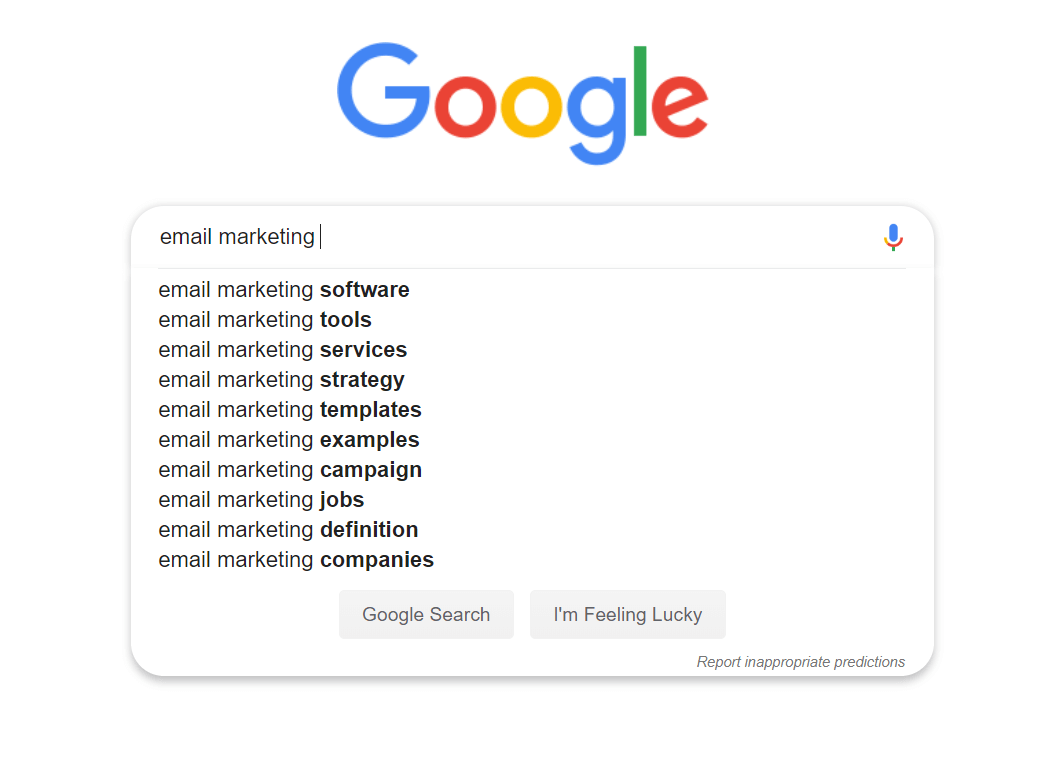
You can combine your seed keyword with different letters from the alphabet to find more autocomplete ideas (e.g. email marketing a, email marketing b,…)
Here’s another example of keyword ideas that can be found in the Google results page:
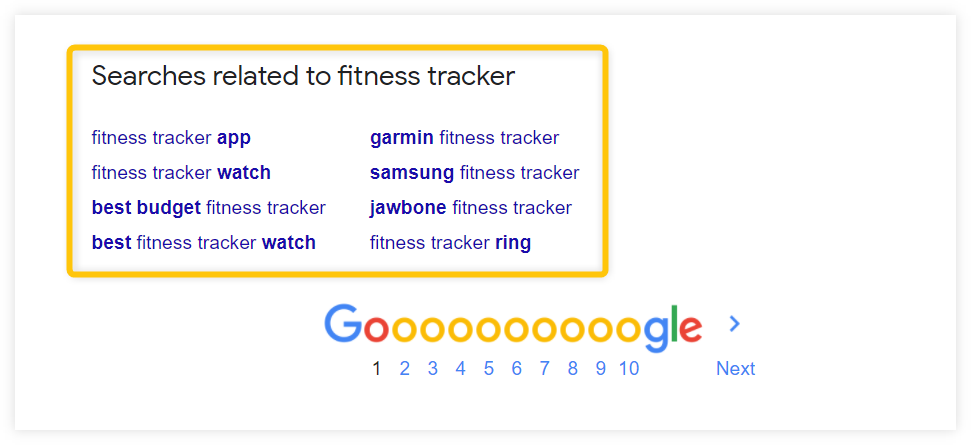
The suggestions are based on real search queries used by people all over the world.
Note: Besides Google, there are many other platforms that can help you find new keyword ideas. Focus on the ones people in your niche use to ask questions, communicate and share ideas. Some examples: Reddit, Quora, YouTube, forums, Facebook groups…
Keyword tools
There are many free keyword tools that can give you hundreds of keyword ideas based on a single seed keyword. The problem is: they are very limited when it comes to other features.
So if you make money with your website in any way, a quality paid keyword tool is a great investment that will pay off sooner or later.
Besides the keyword suggestions, professional tools offer other useful SEO metrics and insights to evaluate the keywords and pick the best ones. So they can save you a lot of time and give you a competitive advantage.
There are two ways to start keyword research with a keyword tool:
- seed keyword
- competitor’s domain/URL
Here’s what a list of keyword suggestions looks like in KWFinder:
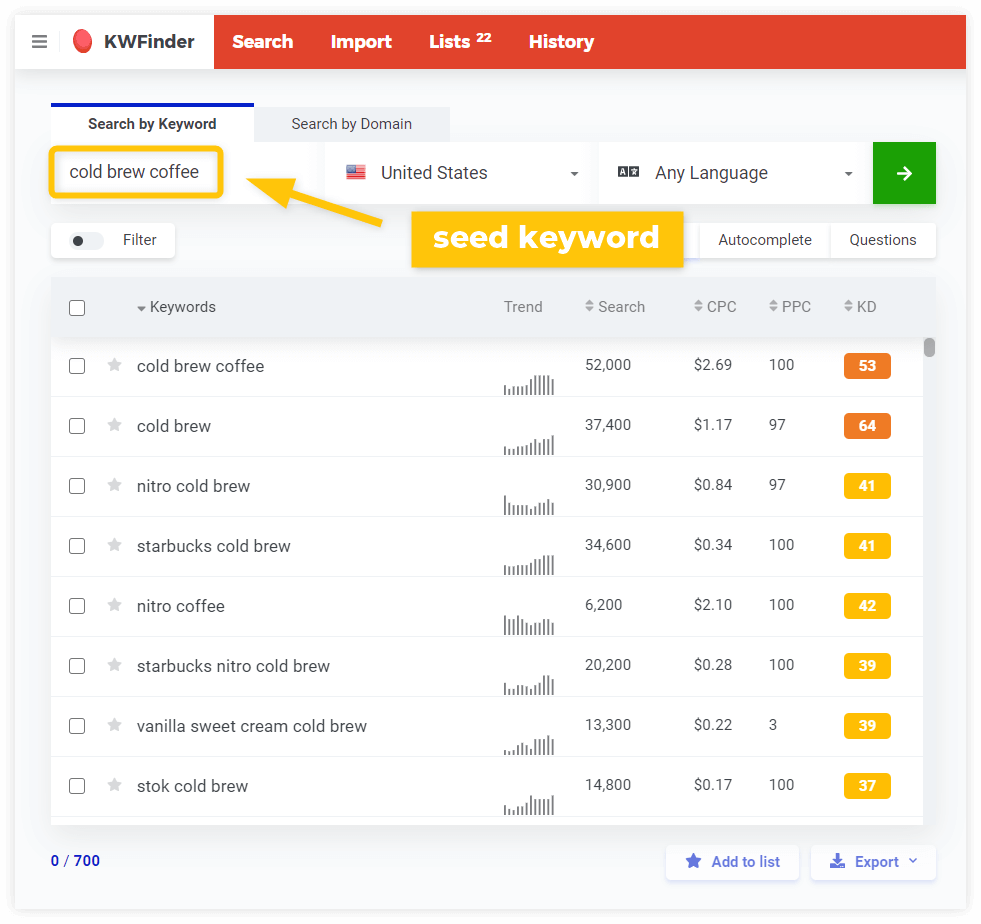
You can also look for the keywords your competitors rank for by simply typing their domain or URL:
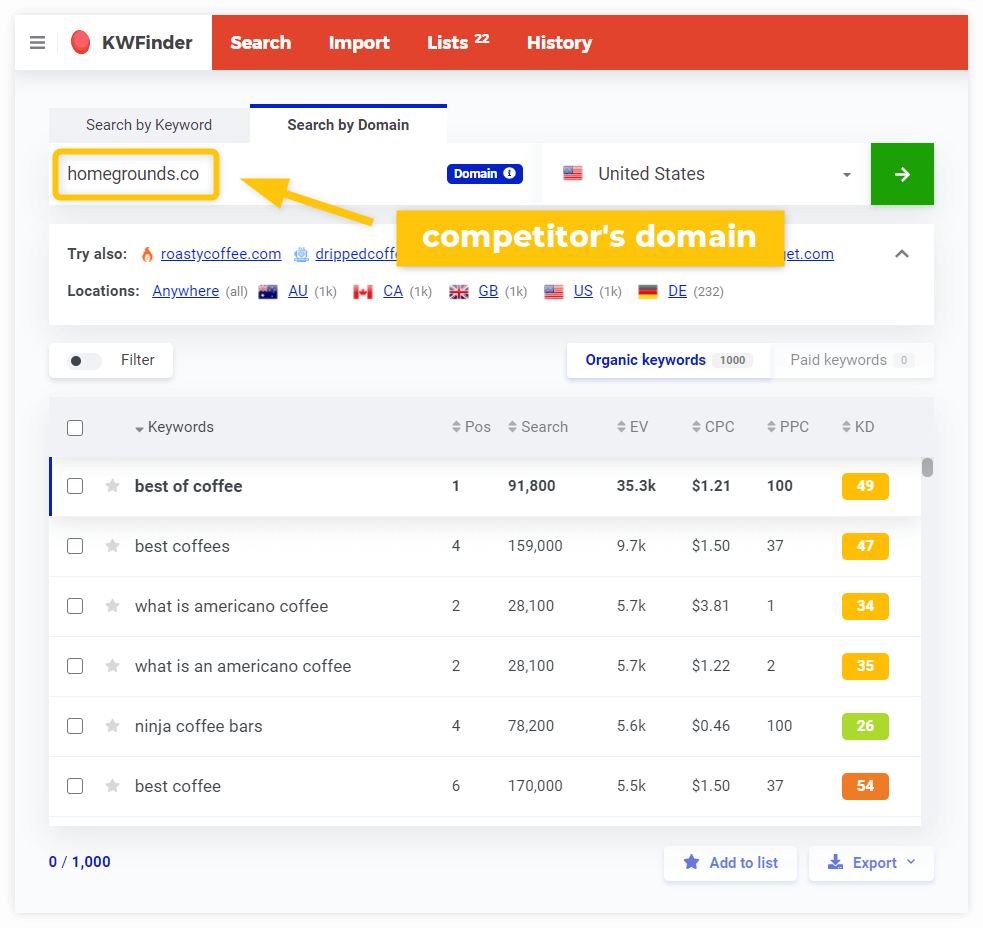
Besides keyword suggestions, it calculates the difficulty of ranking for the keywords and helps you to analyze the SERP.
This brings us to the next important part:
Keyword metrics
Your goal is to find relevant keywords with high search volumes and low keyword difficulty – an ideal combination of the three most important factors of keyword research.
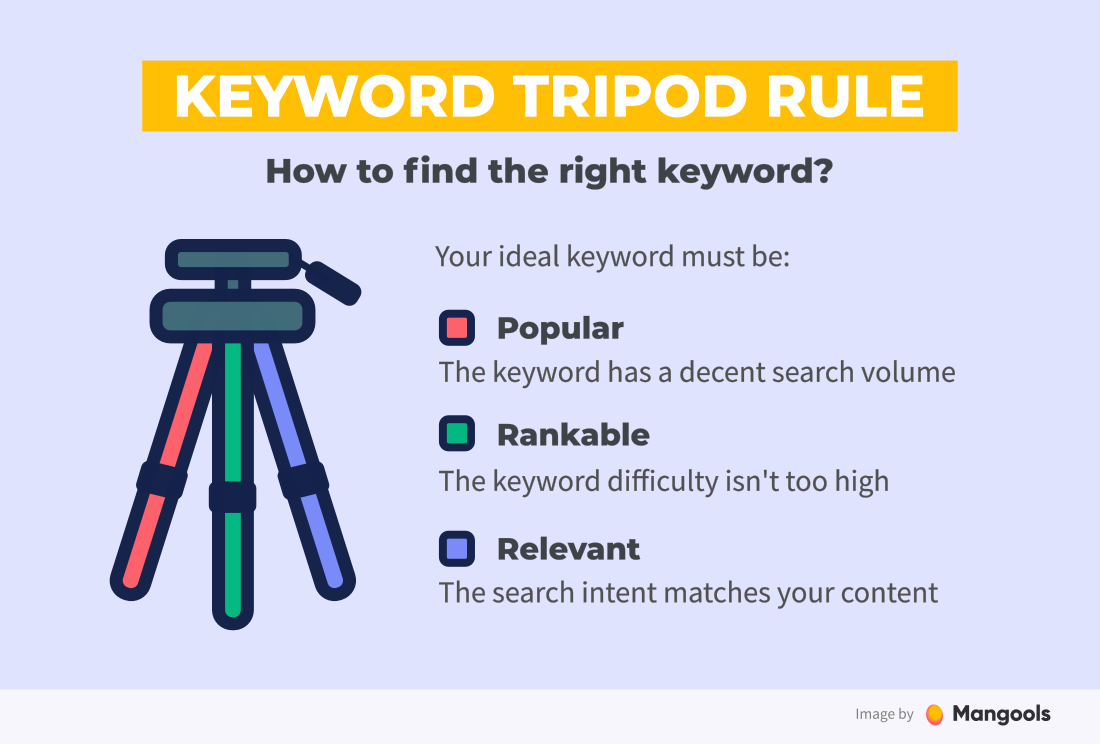
We call this principle The Keyword Tripod Rule and the three factors represent the three legs.
As soon as you take one of the legs, the tripod will collapse.
Search volume
In the past, content creators did keyword research only to find the keywords with high search volumes.
They stuffed them into content to trick the search engine algorithms and ensure high rankings in organic search. Since then, keyword research has become a lot more complex.
Long-tail keywords vs. search volumes
Many keyword research guides recommend focusing on the so-called long-tail keywords – keywords that are more specific and usually consist of more words.
The reason is simple:
Long-tail keywords tend to have lower difficulty and higher conversion rates. It’s because the query is more specific, so there’s a higher chance the user is further down the buyer’s journey.
Not to mention that there are hundreds of them – the estimate is that about 70% of all the traffic comes from long-tail keywords.
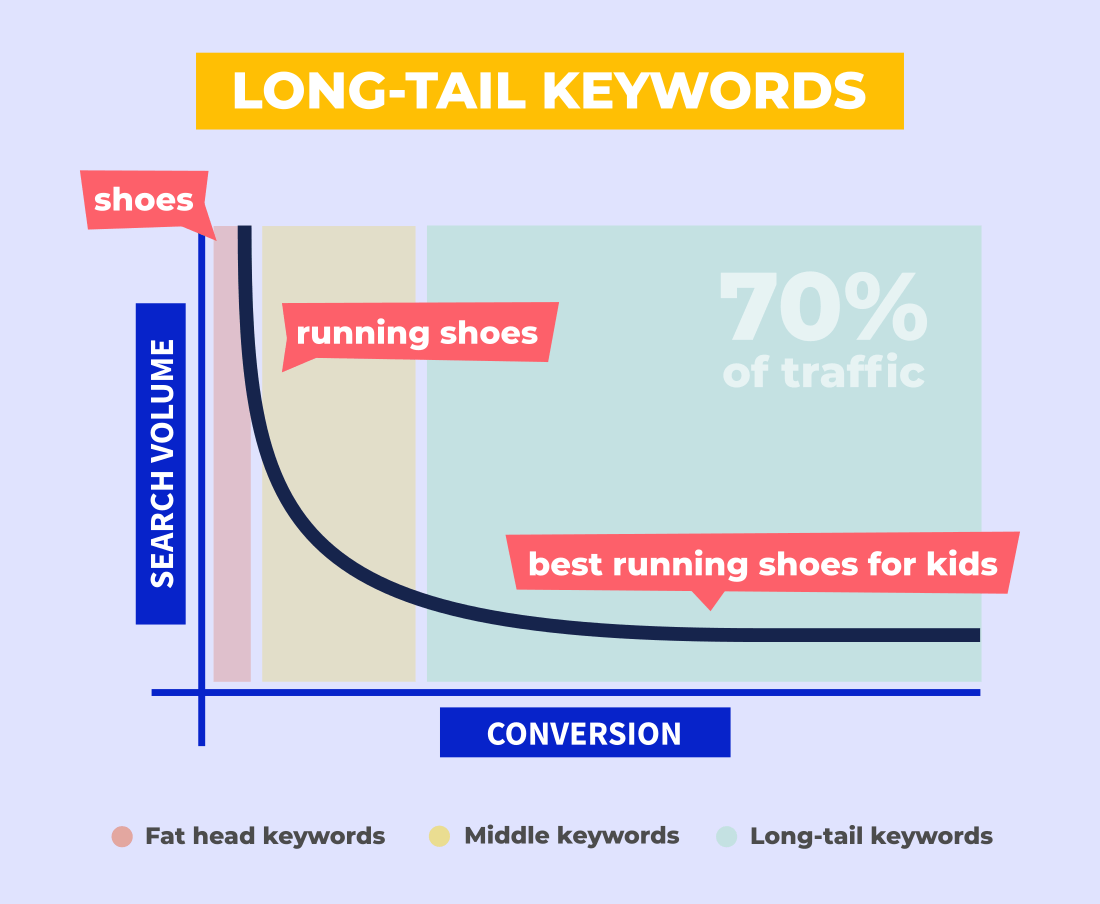
Besides, ranking only for high-volume keywords is not always possible.
The truth is that as a new website, you simply won’t be able to rank for big keywords. It doesn’t mean you shouldn’t try it once you establish yourself on the market and get some authority.
It’s all about evaluating your actual chances. The metric called keyword difficulty can help you with that.
Keyword difficulty
Once you find keywords you want to rank for, you’ll need to find out how hard it will be by evaluating the competition. It is usually expressed with the metric called keyword difficulty.
In most tools, the keyword difficulty value is indicated on a scale from 0 to 100. The higher the score is, the harder it is to rank on the 1st SERP for the keyword.
It is based on the authority of pages ranking for the given keyword.
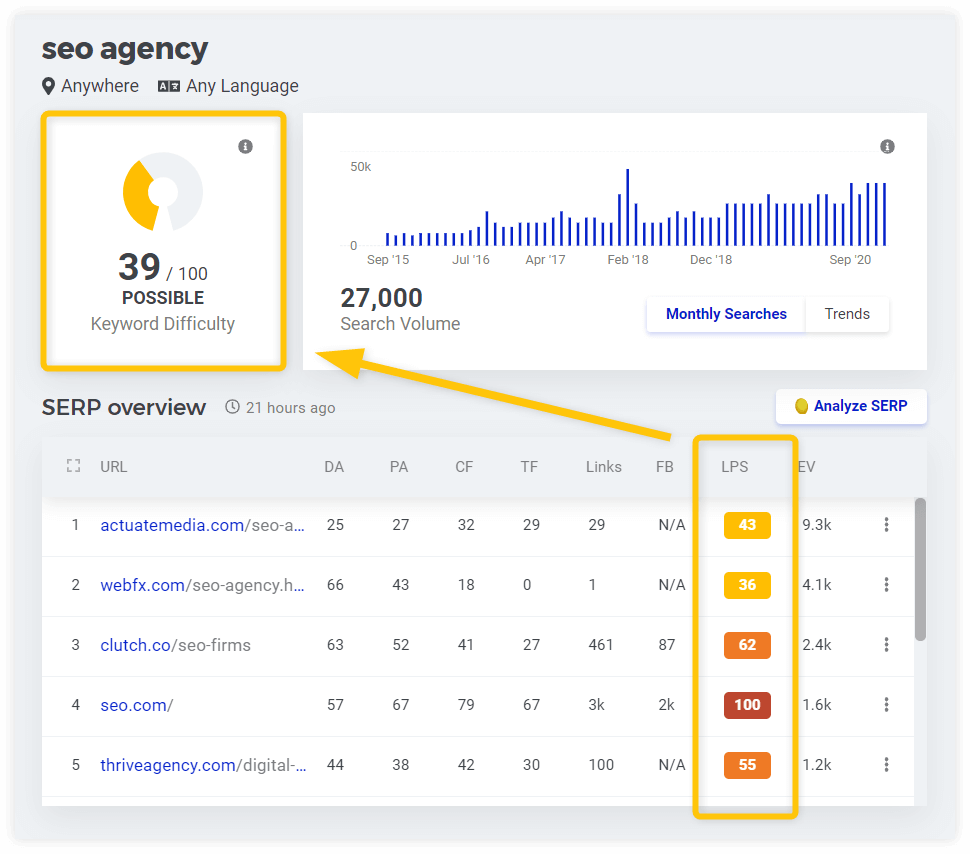
By keeping an eye on keyword difficulty:
- You’ll get a great overview of what are the “big” keywords and “big” players in your niche
- You’ll be able to identify keywords that you have an actual chance to rank for
- You’ll be able to save a lot of time by focusing on keywords that can bring you results even if you don’t have much authority yet
Note: The keyword difficulty values may vary in different tools – you can see a score 30 in one tool and 50 in another one for exactly the same keyword.
That’s because the calculations are based on slightly different metrics and algorithms. The important thing is to compare the results within one tool. Keyword Research for Beginners is one of the basic SEO tasks. In this chapter, you will learn how to find your niche and rank for your Website.
Keyword relevance
Last but not least, your keyword must be relevant. The easiest way is to do a proper SERP analysis to find out:
- Whether you are able to compete with websites in the 1st SERP (see the previous part about keyword difficulty)
- What is the search intent behind the keywords you want to optimize for By looking at the SERP you can identify what’s the search intent behind the query and whether it matches your content.There are 4 different search intent types:
- Navigational – search for a specific website/brand
- Informational – search for general information
- Transactional – the user wants to buy something online
- Commercial – the user does the research before purchase
Look at this table to see some examples:
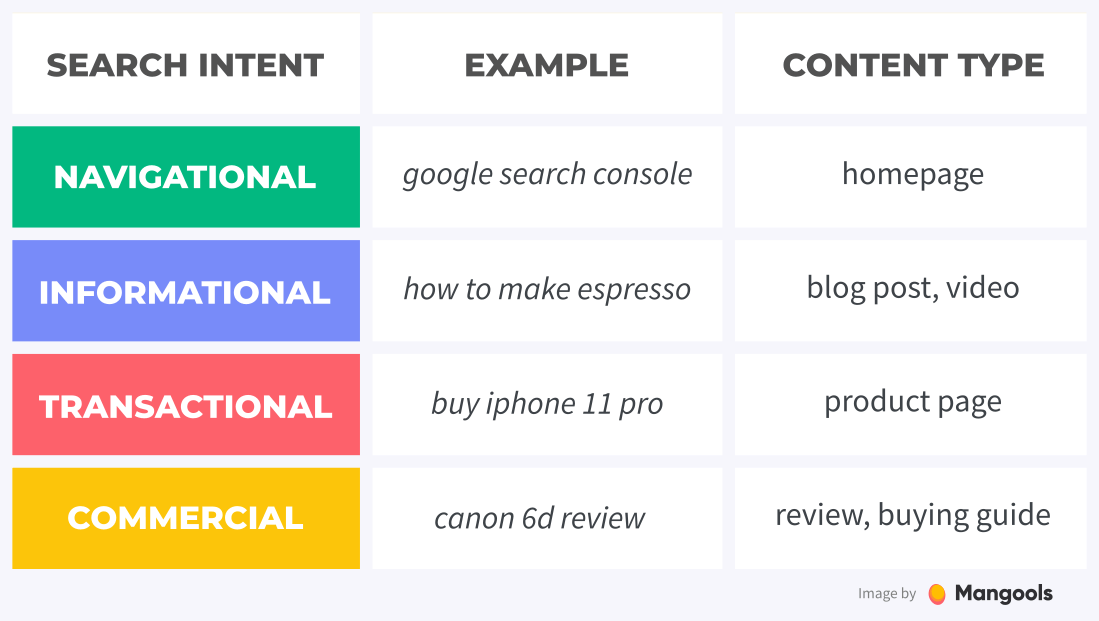
Let’s say you run an e-commerce store with fitness equipment. You want to optimize your squat racks product page and you find the keyword “best squat rack”. It has a solid search volume and the difficulty is not too high.
However, if you look at the search results, you’ll notice that all the pages ranking for “best squat rack” are reviews and buying guides, not product pages. In other words, Google considers it a commercial, not a transactional keyword. Keyword Research for Beginners is one of the basic SEO tasks. In this chapter, you will learn how to find your niche and rank for your Website.
A quick look at the SERP will tell you that.
Always keep this in mind so you won’t end up optimizing for the wrong keywords.
One of the biggest mistakes people make with keyword research is that they only look at the numbers they see in the keyword tool.
They rarely consider intent when in reality, it is even more important than search volume.
Why?
First, Google really knows what kind of content they want to see for each query and if you check the top results, you will often see similar results.
So if you don’t fall into the categories they want to see, your chances of ranking are extremely low, even if you have all the link metrics.
Second, even if you actually land visitors from Google, tiny changes in the query mean very different things to people and some may be interested in buying your stuff while others really couldn’t care less.
For example:
If you check the keyword “vacuum cleaners” a lot of people are searching for it (223,000 average monthly search volume).
But people are more likely to look for brand results and e-commerce pages and this is why Google returns Amazon, Dyson and Walmart results. Keyword Research for Beginners is one of the basic SEO tasks. In this chapter, you will learn how to find your niche and rank for your Website.
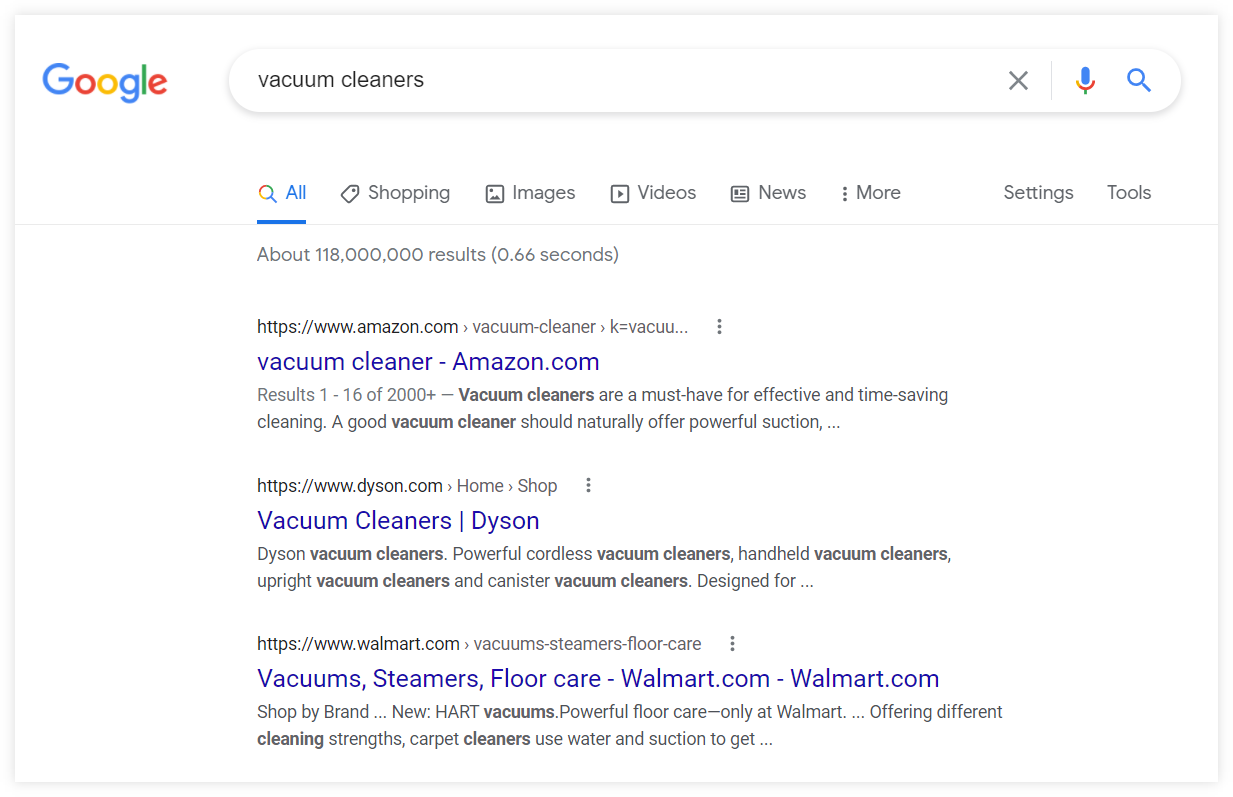
And you’re not very likely to sell them anything.
Whereas the query “best vacuum cleaners” has a lot less search volume (13,000 average monthly search volume). But the query is much more commercial in nature and will for sure generate more revenue which is why Google is showing buying guides instead of Walmart product page. Keyword Research for Beginners is one of the basic SEO tasks. In this chapter, you will learn how to find your niche and rank for your Website.
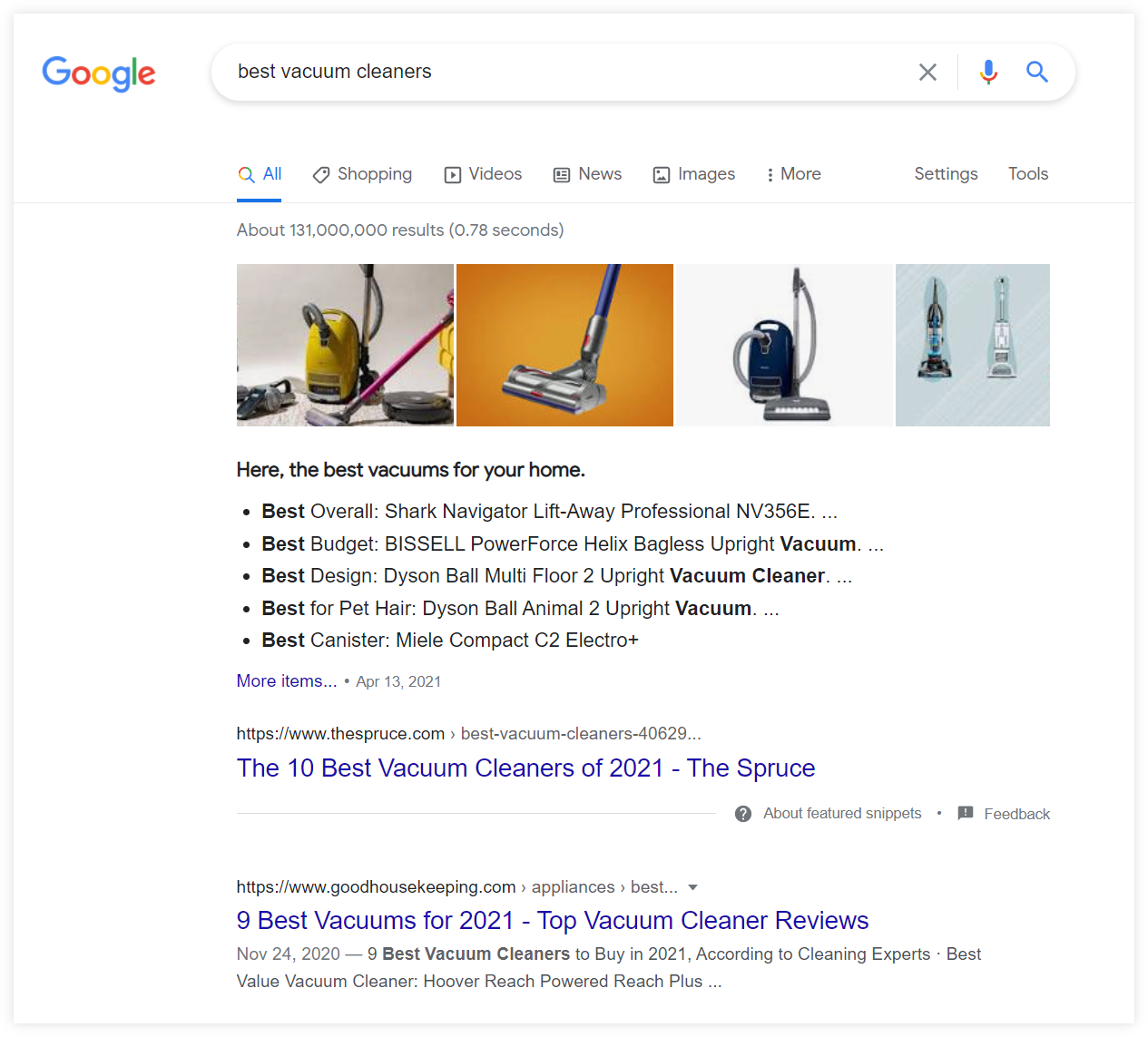
So don’t just focus on search volume, intent is the most important metric.
Conclusion
In conclusion, the extensive keyword research conducted has revealed crucial insights into our target audience’s interests and search behaviors. By identifying high-volume, low-competition keywords, we have unlocked opportunities to enhance our online visibility and drive organic traffic to our platform. Additionally, understanding long-tail keywords has offered valuable insights into specific user intent, enabling us to tailor our content strategy to better meet their needs. Keyword Research for Beginners is one of the basic SEO tasks. In this chapter, you will learn how to find your niche and rank for your Website.
Moreover, discovering niche keywords presents avenues for targeted marketing campaigns, allowing us to reach more segmented audiences effectively. Leveraging these keywords across our content, SEO, and advertising initiatives will be instrumental in maximizing our online presence and staying competitive in our industry.
The competitive analysis unveiled key trends and gaps within our market, offering a strategic advantage to position ourselves uniquely. Incorporating these findings into our marketing strategy will enable us to capitalize on untapped opportunities and create content that resonates with our audience while staying ahead of industry shifts.
Continued monitoring and adaptation of our keyword strategy in response to evolving trends will be essential for maintaining our competitive edge. Regular reassessment and refinement of our keyword selection will ensure our content remains optimized for search engines and aligned with our audience’s evolving needs.
Ultimately, this comprehensive keyword research serves as a foundation for informed decision-making, guiding our marketing efforts towards sustainable growth and increased engagement. Implementing these insights will undoubtedly strengthen our digital presence and drive measurable results in the ever-evolving landscape of online visibility and consumer behavior. Keyword Research for Beginners is one of the basic SEO tasks. In this chapter, you will learn how to find your niche and rank for your Website.
Sources: Mangools




